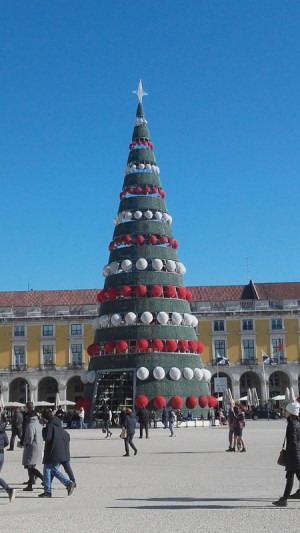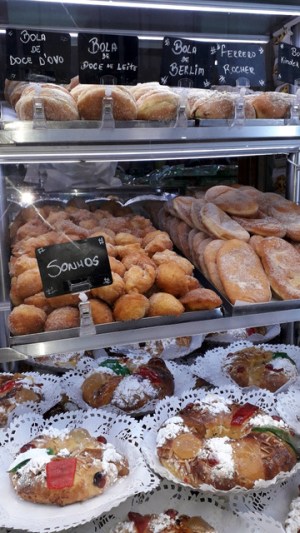Portuguese Christmas Fruit Cake Recipe

Portuguese Christmas Cake: A Delicious Festive Tradition
The holiday season in Portugal is incomplete without indulging in the iconic Bolo Rei, a traditional Portuguese Christmas cake. This festive delight, often referred to as the “King Cake of Portugal,” is a true reflection of the country’s rich culinary heritage. Whether you’re exploring the vibrant streets of Lisbon or enjoying a cozy family gathering, Bolo Rei is a must-try. This cake, filled with dried and candied fruits, nuts, and spices, not only graces the tables of Portuguese households but also symbolizes the joy and warmth of the season.
The Allure of Bolo Rei: A Festive Masterpiece
Prepare to immerse yourself in the flavors and traditions of Portugal with Bolo Rei, a cake that encapsulates the essence of Christmas. This sweet bread is generously filled with a rich mixture of almonds, walnuts, pine nuts, and raisins, and topped with an array of candied fruits. The cake’s golden crust and vibrant crown of fruits make it a centerpiece at any holiday gathering, inviting everyone to partake in a slice of Portuguese festive cheer.
From its tantalizing aroma to its delightful taste, Bolo Rei offers a sensory experience that transports you straight to a Portuguese Christmas celebration. This Portuguese Christmas fruit cake recipe is a testament to the country’s love for tradition and flavor, and it’s sure to become a favorite in your holiday repertoire.
Read more: Best Time to Visit Portugal.
Unveiling the History of Bolo Rei
 The story of Bolo Rei dates back to the late 19th century when it was introduced to Portugal by a French pastry chef at Lisbon’s renowned Confeitaria Nacional. Inspired by the French gâteau des Rois, a traditional cake from Toulouse, Bolo Rei quickly became a staple in Portuguese Christmas festivities.
The story of Bolo Rei dates back to the late 19th century when it was introduced to Portugal by a French pastry chef at Lisbon’s renowned Confeitaria Nacional. Inspired by the French gâteau des Rois, a traditional cake from Toulouse, Bolo Rei quickly became a staple in Portuguese Christmas festivities.
Traditionally enjoyed from early December until Epiphany on January 6th, Bolo Rei is more than just a cake; it’s a symbol of the Three Kings’ gifts to Baby Jesus. The cake’s golden crust represents the gift of gold, while the array of dried and candied fruits symbolizes the offerings of myrrh and frankincense. Each slice of this cake is a piece of history, steeped in the rich cultural heritage of Portugal.
The Recipe: How to Make a Traditional Portuguese King Cake
Ready to bake your own Portuguese King Cake? Here’s how you can create this festive masterpiece at home.
Ingredients:
- 1 kg wheat flour
- 400 g candied fruits (apple, cherry, orange, fig) for decoration
- 350 g dried fruits (almonds, walnuts, pine nuts, raisins)
- 200 g sugar
- 200 g butter
- 200 ml milk
- 6 eggs
- 100 ml spirits (firewater or rum)
- 50 g dried yeast
- 20 g salt
- Egg yolk wash for brushing
- Icing sugar or granulated sugar for sprinkling
Instructions:
- Activate the yeast: In a glass, mix the warm milk with yeast and salt.
- Prepare the dough: In a small bowl, beat the eggs and add the melted butter, yeast mixture, and spirits.
- Combine dry ingredients: In a large bowl, mix the flour and sugar.
- Mix wet and dry ingredients: Gradually add the egg mixture to the flour and sugar, kneading until a dough forms.
- Add fruits and let rise: Incorporate the dried fruits into the dough and let it rise in a warm place for about an hour.
- Shape and decorate: Preheat the oven to 180ºC (350ºF). Shape the dough into three crowns, brush with egg yolk, and decorate with candied fruits.
- Bake: Bake each crown on a buttered tray for approximately 20 minutes. After cooling for 30 minutes, sprinkle with icing sugar.
Bolo Rainha: A Regal Alternative
If candied fruits aren’t your preference, Bolo Rainha (Queen Cake) is the perfect alternative. This Portuguese Christmas cake is similar to Bolo Rei but omits the candied fruits in favor of a more subtle nutty flavor. With a generous filling of walnuts, almonds, and pine nuts, Bolo Rainha offers a delightful variation that still embodies the festive spirit of a traditional Portuguese Christmas.
Is Portuguese King Cake Suitable for Vegetarians?
Yes! Portuguese King Cake is vegetarian-friendly as it contains no meat or fish. The traditional recipe revolves around sweet bread, dried fruits, and nuts, making it a perfect choice for vegetarians looking to enjoy a piece of Portuguese Christmas tradition.
Can You Make a Vegan or Gluten-Free Bolo Rei?
While the classic Bolo Rei recipe includes eggs and wheat flour, you can certainly adapt the recipe for vegan or gluten-free diets.
For a Vegan Bolo Rei:
- Replace eggs with a flaxseed or chia seed mixture.
- Substitute butter with a plant-based alternative.
- Use non-dairy milk such as almond or oat milk.
For a Gluten-Free Bolo Rei:
- Use a gluten-free flour blend in place of wheat flour.
- Ensure all other ingredients, including baking powder and yeast, are gluten-free.
These adaptations allow you to enjoy Bolo Rei while adhering to your dietary preferences without compromising on taste or tradition.
Read here: Eco-Friendly Gift You Can Buy in Portugal.
 Exploring the Rich Tapestry of Portuguese Christmas Cakes
Exploring the Rich Tapestry of Portuguese Christmas Cakes
Beyond Bolo Rei and Bolo Rainha, Portugal’s festive culinary scene is brimming with delicious Christmas cakes and pastries. Whether you’re seeking traditional treats or modern twists, there’s something for everyone.
- Portuguese Almond Cake: A moist and flavorful cake made with ground almonds, perfect for those who prefer nutty desserts.
- Portuguese Fig Cake: A dense and rich cake that highlights the sweet, earthy flavor of figs, a fruit cherished in Portuguese cuisine.
- Portuguese Rice Cake: A unique cake made with rice flour, offering a chewy texture and a subtly sweet flavor.
Each of these cakes reflects a different aspect of Portugal’s diverse culinary traditions, making them a delightful addition to your holiday table.
How Many Calories in a Slice of King Cake?
For those mindful of their caloric intake, a 100-gram slice of Bolo Rei typically contains around 310 calories. While this festive treat is indulgent, it’s meant to be enjoyed in moderation as part of the holiday celebrations.
Embracing Portuguese Christmas Traditions
Portugal’s Christmas traditions are as rich and varied as the country’s culinary delights. From the vibrant Christmas markets to the midnight Mass on Christmas Eve, known as “Missa do Galo,” the holiday season in Portugal is a time of joy, reflection, and community.
Christmas Eve Dinner: A Feast for the Senses
The Portuguese Christmas Eve dinner, or Consoada, is a feast that brings families together around the table. The meal traditionally features Bacalhau com Todos (salted codfish with vegetables), followed by an array of desserts, including Bolo Rei. This meal is a testament to Portugal’s deep-rooted family values and love for good food.
Make Your Own Portuguese Christmas Feast
Bring a piece of Portugal to your holiday celebrations with these traditional recipes:
- Bifana (Portuguese Pork Sandwich): A savory sandwich made with marinated pork, perfect for a hearty meal.
- Portuguese Custard Tarts: These creamy, flaky pastries are a beloved Portuguese dessert that pairs wonderfully with a cup of coffee.
- Piri Piri Chicken: A spicy and flavorful dish that showcases Portugal’s love for bold flavors.
These dishes, combined with Bolo Rei, will transport your taste buds to Portugal, making your Christmas celebration truly special.
Read here: Portugal New Year Breaks.
 Dive into Portugal’s Culinary Heritage with a Food and Wine Tour
Dive into Portugal’s Culinary Heritage with a Food and Wine Tour
If you’re captivated by the flavors of Portugal, consider embarking on a culinary adventure with a food and wine tour. These tours offer a unique opportunity to explore Portugal’s rich gastronomic traditions, from the vibrant markets of Lisbon to the vineyards of the Douro Valley.
What to Expect on a Portuguese Food and Wine Tour:
- Hands-On Cooking Classes: Learn to prepare traditional Portuguese dishes under the guidance of expert chefs.
- Wine Tastings: Discover Portugal’s renowned wines, from Port to Vinho Verde, with guided tastings led by knowledgeable sommeliers.
- Cultural Immersion: Experience the warmth of Portuguese hospitality as you explore local markets, dine in charming taverns, and enjoy the stunning landscapes.
This culinary journey will deepen your appreciation for Portuguese cuisine and culture, leaving you with unforgettable memories and new cooking skills to bring home.
Read more: Best Things to Eat in Portugal?
Celebrate Christmas the Portuguese Way
This holiday season, bring the flavors of Portugal to your home with the timeless tradition of Bolo Rei. Whether you choose the classic version, a nutty Bolo Rainha, or one of the many other festive Portuguese cakes, you’re sure to delight your family and friends with these delicious treats. Embrace the warmth, flavor, and joy of a Portuguese Christmas, and create lasting memories with every bite.
Check out the best recipes:
- Bifana – Portuguese Pork Sandwich
- Portuguese Steak Recipes
- Portuguese Custard Tarts
- Piri Piri Chicken
- Seafood Rice

